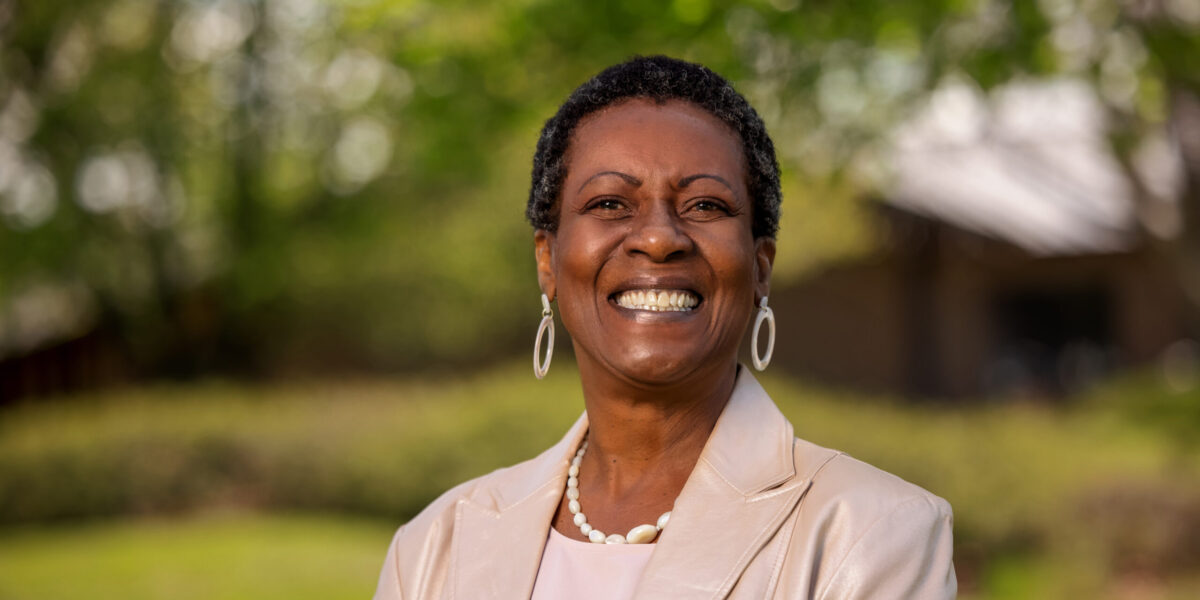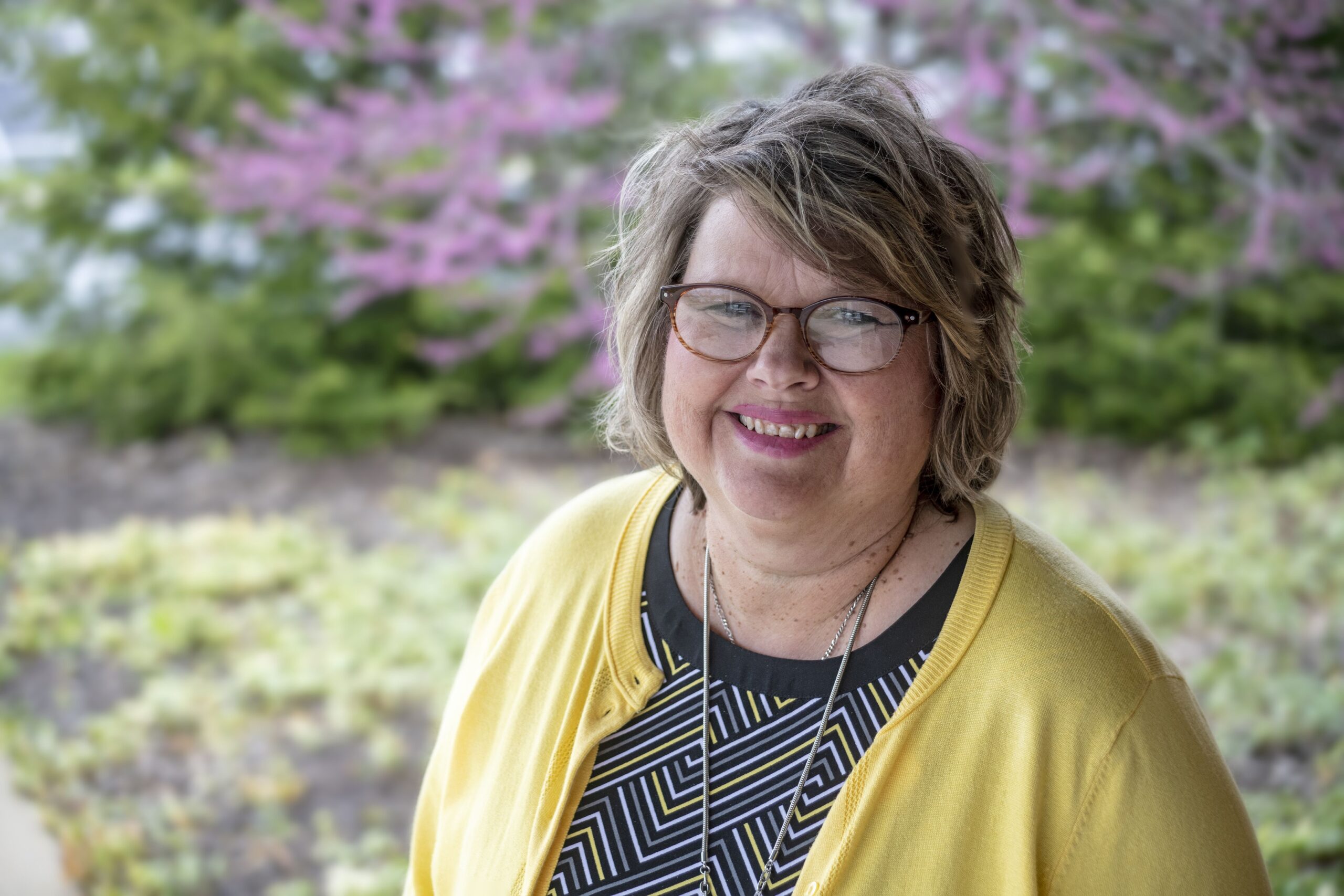NEWTON, Kansas (Mennonite Mission Network) — Ever since she was a child, Ann Jacobs has known there is something very special about God. So special, in fact, that she has spent her life deepening her spiritual walk and empowering others to do the same.
As she grew up in South Bend, Indiana, Jacobs described, in a recent interview, that she experienced several profound connections to God between the ages of seven and 10. Those experiences are still alive in her soul today, said Jacobs, who has worked at Mission Network since 2002. She currently serves as a Church Relations associate, and this spring she graduated with an M.Div. from Anabaptist Mennonite Biblical Seminary (AMBS).
Her parents, Annie Louise and Rufus Verse, helped form her faith, as the third of eight children, Jacobs said. They planted the first seeds of her passion for sharing the gospel in multiple contexts. Her graduate degree has also caused that early spiritual passion to mature in her adult ministry of providing multicultural resources to constituents.
"As I was waiting to go to an event with my parents, I all of a sudden felt the presence of God all around me in a very palpable way," Jacobs said. "I remember that experience in the light of Psalm 91, which reminds us that we are within the shadow, presence and peace of God."
As a girl, she received a peaceful and powerful spiritual covering from her Baptist parents and her Pentecostal grandmother, Mary Harrison.
"They were devout believers, and they constantly soaked me in Scriptures and prayer," Jacobs said. "They came out of generations that struggled with a history of slavery, injustice and lynchings, which helped to strengthen their faith in a God of deliverance. Though we didn’t go to church every Sunday, I remember breakfast cooking on the stove, while gospel songs from the radio wafted in the background."
Jacobs also remembers how their home was a haven for strugglers. "Dad picked up people and brought them to our house to feed and clothe them," she said. "My parents weren’t rich, but they were wonderful people and missionaries to everybody."

Ann Jacobs when she was six years old. Photo provided.
Carrying on the legacy of caring
Now a matriarch of her own blended family, based in South Bend, Jacobs said she strives to carry on this legacy of caring in her work and at home. For example, while she nurtures four sons and 21 grandchildren, with her husband, Booker, she also nurtures her Mission Network ministry.
For 12 years, she was office service manager at Mission Network, a heavily administrative position that was not a great fit for her as a people person. "I kept asking myself why I was doing a job that didn’t really fit with my passions and gifts," Jacobs said. "Eventually, those questions led me into some other avenues that were more pastoral and relational."
In the latter years of that role, she began visiting African American congregations to provide inspiration and resources. In 2009, she co-founded an intercultural agency worship team, Work in Progress. Other co-leaders included Sandy Miller, senior executive for Mission Network’s Resourcing and Mobilization division, and Lefuarn Harvey, former event planning coordinator for Mission Network’s Church Relations, who has since retired.
"We provided workshops on worship and intercultural relations," Jacobs said. "Though the team is not traveling as it once did, it is still seen as a catalyst that offers resources on intercultural relations, peace, social justice and worship."
In 2014, Jacobs became a Church Relations associate. Today, she resources BIPOC (Black, Indigenous, People of Color) congregations in two Mennonite Church USA area conferences — Gulf States Mennonite Conference and New York Mennonite Conference. When called upon, she also relates more broadly within the agency’s constituency. "Both Black and White churches are wanting to better tie in multicultural understandings and anti-racism in their congregational sense of mission," she said.
Miller, Jacobs’ supervisor, said that Jacobs’ desire to better understand and relate to Mennonite Church USA leaders was part of her impetus for completing her M.Div. As Jacobs was learning about Anabaptist history and biblical hermeneutics, as well as gaining more insight into herself as a leader, she found a natural platform for deep conversations about anti-racism and church life.
"My work with Ann required listening carefully and learning about her and her experience as a Black woman working in Mennonite Church USA circles," Miller said. "In turn, she learned about what it was like for me, as a White woman, to grow up in a traditional Mennonite church and home. My life is forever changed by my years of working and growing with Ann."
Jacobs said she loves many aspects of her role, though her favorite is living out the Anabaptist call to missions in diverse contexts.
"Each congregation is seeking to deepen this sense of call in its own, unique way," Jacobs said. Yet, she notices differing patterns. "Black churches tend to trust a personal God of deliverance, which likely stems from our history of oppression," she explained. "From my perspective, White churches tend to question more through a ‘wait and see’ approach, though storytelling about one’s journey with God is encouraged."
No matter where she ministers, Jacobs believes the church is always changing, such as striving today to embody anti-racist practices and attitudes. And yet, it is also true that the God of the gospel never changes. "God’s grace and truth are always present in all of our struggles," Jacobs said. She has understood in her walk with God that, "The grace I offer to you in your struggles is the same grace and mercy God expects to be offered to all members of the church."
Living into Revelations 7
Even as striving for unity in Christ is the goal, the histories and the cultural realities of Black and White Anabaptists differ, Jacobs believes. The church ought not to erase those differences but learn how to better navigate through the challenges these realities evoke, she said. Seminary studies have helped her with that, as has Mission Network’s commitment to becoming a more anti-racist organization.
Jacobs reflects, "We have heard the false claim that Christianity is fundamentally a White religion. God’s vision for the reconciliation of all things in his son requires that my Blackness, and the identity of my Brown brothers and sisters, exist through eternity." She believes the church must discern and trust how the spirit is moving in this post-modern era, beyond a colonialist reading of the Scriptures to one that includes the stories of all tribes and tongues and nations, as expressed in Revelations 7.
Jacobs said her favorite author is Esau McCaulley, who wrote Reading While Black. The book demonstrates how colorblindness is not biblical and falls short of the glory of God. "Within the Israelite community, and at the origin of the early church, we find Black and Brown believers," she said. "When the Black Christian enters the community of faith, she is not entering a strange land. She is finding her way home. Seeing myself as an initial thought in the eyes of God offers value to me as a Black woman of faith."
No doubt, the power of the spirit’s visitation upon that girl in South Bend will continue to strengthen Jacobs’ voice, perspective and witness within the multiracial chorus proclaiming the Lamb of God as Savior of all people of all times.








